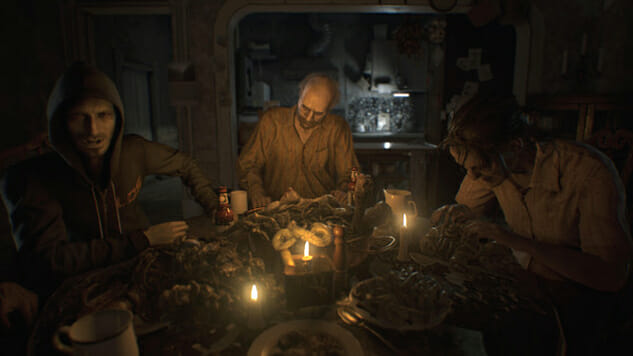On Resident Evil 7 and Creating a Series Identity

Despite being a fan of Capcom’s Resident Evil games for twenty years, I still struggle to assign any specific identity to the series. Whatever through line connects the events at the Spencer Mansion to the same characters punching boulders inside of a volcano has all but disappeared in my mind. All that remains is a list of names and events in chronological order, each getting increasingly more absurd to the point where I am not completely sure whether or not much of it actually happened. After the bombastic, though critically-maligned, Resident Evil 6, it did not seem that Capcom had a good grasp on the series’ identity any more, either.
With fans and creators alike scratching their heads over what makes a Resident Evil game, no one was really sure what direction the series could take for newer entries.
After Resident Evil 6, series producer Masachika Kawata felt it was time to go back to the drawing board. “We had been hearing a lot from fans that they wanted a return to more of the survival horror from the original games. Following Resident Evil 6, which had gotten to be a massive global-scaled game, we ourselves also thought about what to do next,” stated Kawata. “We couldn’t really go even bigger so we decided to take the opposite approach and bring the game down to a more intimate scale. So, if anything, the fan feedback helped to reinforce the direction we had been thinking about taking.”
Resident Evil has a pretty successful track record with reinventing itself. When Resident Evil 4 was released on the GameCube in 2004 in the form of an action title, it was hailed as one of the greatest videogames of all time. This allowed Kawata’s team a bit of a longer leash in trying to figure out what makes Resident Evil work, and what could be left behind in the series’ past.
“When you look at them, each game in the series introduced something new while expanding on the world and overall storyline. Whether it was the two characters going through the same storyline in Resident Evil 2 or the co-op options in Resident Evil 5,” Kawata explained. “The first three games were of course notable for the fixed camera style and the next three games of course changed to over the shoulder with more focus on action. With Resident Evil 7, we are changing things up again with a first-person perspective which also lends itself to the immersive horror we are focusing on.”
Kawata repeatedly emphasized the horror aspect of Resident Evil 7, despite that the word is noticeably absent from descriptions of the last few games. He also explained why the series changed from its roots of zombies and bio-weapons to a local family with murderous intent. “When you think about scary movies or games, common enemies like zombies are of course are scary but you can somewhat detach yourself from having to defeat them in a sense. Humans, on the other hand, are perhaps the scariest of enemies because they are relatable but also unpredictable.” Kawata added, “We wanted to explore this element as an additional layer to the fear you experience in the game.”
“At the core, the Resident Evil games are not just about facing horrifying and challenging situations, but providing the player with the ability to fight back. These aren’t games where things just happen to you in a passive manner; rather, you are an active participant and must interact with the enemies and surroundings in order to make it through.”
It is logical to think that anyone who dares to try to change Resident Evil would be met with resistance. After all, it is fair to say at this point that Resident Evil is a series that people have actually grown up with and have strong feelings about. Depending on the era you were introduced with the series, you might see it as one of two drastically different genres. That legacy can be stifling, but Kawata believes that it frees him up to experiment as he sees fit.“The world of Resident Evil has become huge over the years and certainly provides a lot to work with,” said Kawata. “In some ways, there are so many options for what you can do and so many different aspects that appeal to different players, that it’s more about choosing what to focus on.”
It is hard to tell quite yet if Resident Evil 7 is the beginning of a new era for the series or merely a new perspective hearkening back to the old one. Capcom believes that, in one fell swoop, the game is attempting to accomplish both recapturing the series roots and taking a bold risk in its design. For titles with legacies as extensive as Resident Evil’s, this act is akin to walking a tightrope, but Capcom and Kawata seem assured that they can do it. Whether the series has a confused identity or not, the aim is to make sure that Resident Evil 7 will define what Resident Evil should be.
“From a gameplay perspective,” added Kawata, “we think that RE7 is very much a Resident Evil game, which players will be able to see for themselves very soon.”
Imran Khan is a San Francisco-based writer that tweets @imranzomg.

